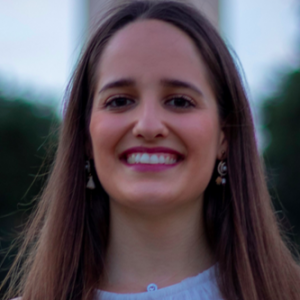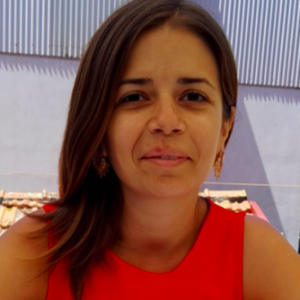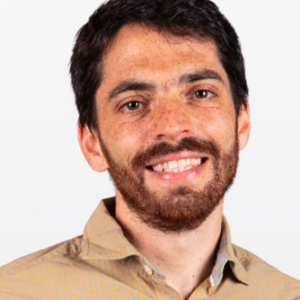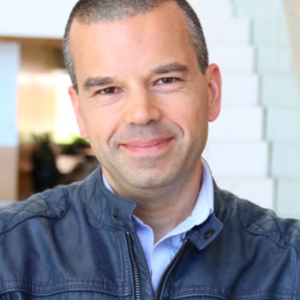Ana Carolina Pádua, Alina Trifan, Leonardo Azevedo and António Neves participated in the Advanced Computing Training Program (ACTP), an initiative that, 2 years ago, allowed scientists from Portugal to spend up to 4 months in one of the world’s most powerful computing facilities for digital modeling and simulation, data management, processing and visualization – the Texas Advanced Computing Center (TACC) at The University of Texas at Austin (UT Austin). Read below what they have been doing and how UT Austin Portugal influenced the course of their careers.

Name: Ana Carolina Correia da Silva Pádua
Organization: CERN – The European Organisation for Nuclear Research
Role in the Organization: Knowledge Transfer Officer for Medical applications

Name: Alina Trifan
Organization: Ubiwhere
Role in the Organization: Delivery Manager

Name: Leonardo Azevedo
Organization: Instituto Superior Técnico
Role in the Organization: Assistant Professor

Name: António Neves
Organization: University of Aveiro
Role in the Organization: Assistant Professor
What made you apply to the ACTP?
Ana Pádua: When I applied for ACTP, I was about to finish my PhD in Molecular Biosciences. During my PhD project, I used Machine Learning algorithms to help me find answers to some of my scientific questions. At that time, I recognized the power that Artificial Intelligence can have in science, and how important it was to master these tools to work more efficiently. Besides my personal experience, I understood that nowadays, AI is everywhere, and big data is exploding. So, if I wanted to build a career with more impact on society, I probably thought this would require expanding my knowledge in High-Performance Computing. I wanted to learn more tools that would enable me to tackle the big challenges of the 21st century. Indeed, one of them is how to manage big data. Another important aspect is to do scalable and reproducible scientific research. Hence, when I heard about this advanced training program sponsored by UT Austin Portugal, I knew this internship would be the perfect complement to have a broader and deeper understanding of how to use big data and artificial intelligence to build a career that could have more impact. The idea of developing those capabilities in one of the best supercomputing centers of the world – the Texas Advanced Computing Center (TACC) in Austin – completely blew my mind!
Alina Trifan: I have always been keen on expanding my knowledge horizons, both personally and professionally. At the time of my application, I was a post-doctoral scholar at the University of Aveiro. I was excited to deepen my knowledge of some of the key technologies I was already using in my research as well as with the opportunity of learning new ones.
Leonardo Azevedo: I applied to ACTP because I wanted to develop my high-performance computing subjects skills and use them to solve scientific questions. I also knew that learning more about this topic would positively impact the research of my group. The ACTP initiative was just what I was looking for. Also, at that time, I thought this would be an excellent opportunity to increase my network of contacts, which, in fact, was.
António Neves: During my academic career, despite several collaborations in research projects, all my work has been conducted at the University of Aveiro, Portugal. Since I have always searched to expand my horizons, I was open to international experiences that would allow me to have a different perspective on my research and teaching challenges and the internal organization of other research institutions. I also had the goal that this Program could translate into collaborations that could benefit both institutions, the University of Aveiro and The University of Texas at Austin.
What were the major activities you developed?
AP: At TACC, I worked in the Life Sciences group, which focuses on applying high-performance computing for studying Life Science through reproducible and scalable methods. In the first weeks, I learned the protocols of communication with the supercomputers and the basis of the main Application Programming Interfaces (APIs) used at TACC. Later, I developed my own Application (named Pycelle) for detecting bright elements in a dark background. This can have many different applications, e.g. to count cells in images from microscopes, quantify droplets in sensors, or even detect stars and galaxies in images obtained by telescopes. In this project, I coded the algorithm using Python as the programming language. I also applied containerization (Docker and Singularity) for the App distribution, and Git for version control. I also participated in several workshops and courses offered byTACC, especially on computational resources for life sciences and data visualization. Moreover, I participated as a mentor in the educative event Code@TACC where I instructed high-school students on how to program in Python, and I supported them in developing their final projects.
AT: I conducted a preliminary study on post-partum depression through social mining. As part of the Health Informatics group, a collaboration between TACC and Dell Medical School, I collected and analyzed social media posts as a first step into understanding whether such mental conditions are reflected on social media.
LA: During my two-month stay, I worked mainly on the methods to solve large-scale seismic inversion problems in collaboration with Prof. Tan Bui-Thanh. Seismic inversion was already the main topic of my research, but this period allowed me to look at this problem from an alternative perspective and develop new research ideas.
AN: I integrated the Visualization Group and worked closely with researchers with scientific interests in Scalable Visualization, Scientific Data Visualization, and Machine Learning and Data Mining. I worked mainly on two tasks: apply Machine Learning in the path-tracing technology that can be relevant to improve the visualization process and reduce the computational complexity; explore and implement a solution for image compression that could be used to efficiently transmit images from the in-situ visualization on HPC systems to high-resolution displays, like the TACC’s Stallion system, one of the world’s highest resolution tiled-displays.
What have you been doing professionally since you ended ACTP?
AP: After ACTP, I joined CERN – The European Organisation for Nuclear Research – as a Knowledge Transfer officer in the Medical applications Section. CERN’s Knowledge Transfer group – Medical applications aims to be an innovation actor in our society’s biomedical sector. My role is to contribute to the application of CERN technologies and know-how (that were initially conceived for studying fundamental physics) in the medical and biomedical domains. My work consists of promoting and establishing partnerships with industries, hospitals, universities and research institutes. To do so, good communication skills are essential. On the one hand, I need to understand very well the cutting-edge technologies that exist at CERN. On the other hand, I need to be aware of hospitals and biomedical companies’ needs and identify the priorities in research institutions. This job is giving me a comprehensive and deep understanding of how to foster innovation. I feel very engaged in contributing to the ultimate goal, which is to improve societies’ quality of life, adding value to projects that can lead to new ways of improving disease diagnosis, prognosis, prevention and treatment.
AT: In the year following my participation in ACTP, I worked as a post-doctoral scholar at the University of Aveiro and continued my research work related to the manifestation of mental health on social media. At the beginning of this year, I left the University of Aveiro, and I am currently employed as a Delivery Manager at Ubiwhere, where I coordinate an H2020 project.
LA: After I finished ACTP, I returned to Instituto Superior Técnico as an Assistant Professor. Meanwhile, I also took responsibilities at the Board of my research center, CERENA, where I am also responsible for the ITLab. The experience I acquired in ACTP was, in fact, important for this last role.
AN: I am following my path as a professor and researcher at the University of Aveiro. I am currently the Director of the Integrated Master Degree in Electronics and Telecommunications Engineering. Next semester, I will coordinate a challenge at the ECIU University, an EU-funded European University that intends to create, test and evaluate a whole new educational model on a European scale. I am developing my research at the Institute of Electronics and Informatics Engineering of Aveiro to integrate research projects and supervise several MSc and PhD students.
How did your experience with ACTP contribute towards your new position?
AP: My experience at ACTP contributed to expanding my knowledge in performance computing, particularly for big data analysis and visualization. This was very important for my current positions at CERN. As a Knowledge Transfer officer, I am mostly dedicated to projects in digital technologies due to my previous experience. CERN is one of the biggest research organizations in terms of computing power. Therefore, one of the biggest challenges is making discoveries in particle physics, making sense of the vast Petabytes of data stored every year. Many projects at CERN involve Artificial Intelligence, Machine Learning, Cloud computing and Containerization. My previous experience at TACC was extremely relevant to my understanding of all these concepts and how they relate. Therefore, this makes me feel more confident in discussions with the experts.
AT: I don’t know if I can say that it directly contributed, but it has definitely taught me many new things, both culturally and professionally. Moreover, I am still following some of the work principles and research good practices that I got to know and appreciate during my participation in the program.
LA: Besides my professional and scientific development, ACTP allowed me to increase my network of contacts. When the program finished, I kept in contact with Prof. Tan Bui-Thanh. We submitted a project proposal for the 2019 Exploratory Research Project Call under the UT Austin Portugal Program.
AN: After the ACTP experience, I am more aware of innovation in my duties, both as a professor and researcher. I am still following some work principles and research good practices that I learned during my participation in the program. ACTP was a unique opportunity to get in touch with state-of-the-art High-Performance Computing and Scientific Visualization tools. The experience at TACC opened a door for important collaborations. We are currently using the TACC HPC systems to process huge amounts of image data to extract relevant information to be integrated into systems for lifelong, memory enhancement or digitize Human Behavior.
Would you repeat the experience? Why?
AP: Absolutely! My experience with ACTP, was one of the best I have ever had, both personally and professionally. I not only acquired new technical and soft skills, but I also made true friendships. I still keep in touch with some of my ex-colleagues who work at TACC and other Portuguese colleagues who participated in the same program. The atmosphere lived in Austin is very special… people are super friendly! And the environment at TACC is so collaborative and engaging! I grew up so much with this experience… I gained more confidence in myself and my capabilities. Of course, being immersed in the American culture contributed to becoming more fluent in English and being aware of different mindsets and ways of working. I became a more versatile person with a wider understanding of how science can be used to change the world for the better!
AT: I would repeat the experience without doubt, as it has been very enriching at all levels. Apart from getting to know a new culture and having the opportunity of being immersed in it, it allowed me to learn new technologies and address new research collaborations.
LA: Definitely, ACTP is an opportunity to get in touch with best-practices in high-performance computing using one of the most advanced IT infrastructures available in the world.
AN: I do not doubt that I would repeat the experience since it was very rich at all levels. These opportunities contribute to shaping personal knowledge, and the future of our Universities and Research Units in terms of research, innovation and collaborations.
